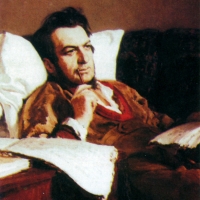Mikhail Glinka
 RUSClassical, Classical Crossover, Chamber Music
RUSClassical, Classical Crossover, Chamber Music

 RUSClassical, Classical Crossover, Chamber Music
RUSClassical, Classical Crossover, Chamber MusicThe father of the Russian nationalist school of music, Mikhail Glinka was a Russian composer and pianist. Glinka, who was born in Saint Petersburg in 1804, began his musical training at the age of 14 when he was sent to Italy to study music. Italian, French, and German music were major influences on Glinka's style, but he is best known for his groundbreaking work in developing a uniquely Russian form of classical music.
The music of Glinka combines classical and folk elements to produce a distinctive sound that has come to be known as Classical Crossover. His songs stand out for their emotional realism, lush harmonies, and soaring melodies. It is impossible to overestimate Glinka's impact on Russian music; composers like Rimsky-Korsakov and Tchaikovsky were inspired by his works. Despite passing away too soon at the age of 53, Glinka's music is still praised for its originality and beauty.
Famous Saint Petersburg, Russian Federation, native and composer Mikhail Glinka is the author of a number of well-known classical and classical crossover tunes. Requiem Mass in D Minor, K. 626: III. Sequentia: Dies Irae - Day of Wrath, "The Lark," "Nocturne in E-Flat Major," "Mazurka in C Major," "Mazurka in C Minor," "Masquerade: Waltz," "The Lark - Live," "The Lark," "The Lark - Live," "Tarantella in A Minor," "
The well-known piece "Requiem Mass in D Minor, K. 626: III. Sequentia: Dies Irae - Day of Wrath" by Glinka has been featured in a number of movies, including as "Amadeus," "The Shining," and "X-Men: Apocalypse." Another well-known Glinka song that has been performed by many singers and used in various media is "The Lark." It is a lovely composition that displays Glinka's aptitude for melodic writing.
The other compositions by Glinka, like "Nocturne in E-Flat Major," "Mazurka in C Major," and "Mazurka in C Minor," are also well-liked by fans of classical music. These songs showcase Glinka's talent at putting together complex arrangements that hold the listener's attention. Two other notable works that highlight Glinka's aptitude for writing classy and delicate music are "Masquerade: Waltz" and "Farewell Waltz." The vibrant and upbeat "Tarantella in A Minor" by Glinka is ideal for dance performances.
In conclusion, Mikhail Glinka's compositions have endured and are still well-liked by music fans around. He has established himself as one of the greatest composers of all time thanks to his ability to write original and fascinating pieces in the classical and classical crossover genres. No matter if it's the melancholy "Requiem Mass in D Minor" or the vivacious "Tarantella in A Minor," Glinka's music will never lose its power to move listeners.
Intriguing new music has recently been released by renowned Saint Petersburg-based Classical and Classical Crossover musician Mikhail Glinka. The three fascinating albums "Tableaux. Piano Evocations (2023), "Glinka: Revisited (2023), and "Romeo & Juliet: Tchaikovsky on the Piano (2023)" are among his most recent compositions. Each record features Glinka's amazing musical range and abilities and is sure to please both classical music fans and skeptics.
In addition to his most recent albums, Glinka recently dropped a number of new singles. Included in this list are "Variations on a Theme of Mozart, Harp (2023)," "Nocturne in E Flat Major, Harp (2023)," "Nocturne Farewell, Harp (2023)," and "K Dniu Rozhdeniia Aleksandra Sergeevicha (2023)". Glinka brilliantly executes each track's gorgeous composition, and they are all well worth listening to.
In general, Glinka's most recent compositions demonstrate his astounding talent and proficiency in the classical and classical crossover music genres. His albums and singles have sophisticated melodies, subtle harmonies, and brilliant compositions that are sure to enthrall and enchant listeners. No matter if you've been a Glinka fan for a long time or are just interested in classical music, you should check out his most recent pieces.
Throughout his career as a composer of classical and classical crossover music, Mikhail Glinka collaborated with a number of musicians. A significant collaboration of his was with Wolfgang Amadeus Mozart on the song "Requiem Mass in D Minor, K. 626: III. Sequentia: Dies Irae - Day of Wrath." The two musicians' talents were beautifully displayed in the music that was the product of their collaboration. The talents of Glinka as a composer and Mozart as a pianist and composer came together to produce a melodic and harmonies sound.
On the song "The Lark," a noteworthy collaboration is with Evgeny Kissin. Together, Glinka and Kissin produced a lovely, cheerful piece that demonstrated both their talents as composers and pianists. The song demonstrated the two musicians' strong chemistry and shared passion for classical music.
The song "Nocturne in E-Flat Major" by Glinka and Xavier De Maistre is a hauntingly lovely composition. The song demonstrated Glinka's talent for writing lovely melodies, and De Maistre's proficiency on the harp gave the music a distinctive and ethereal quality.
Overall, the music produced by Glinka's collaborations with other musicians is among the most exquisite and unforgettable in the classical and classical crossover genres. His abilities as a composer and his capacity to cooperate effectively with other musicians to produce a melodious and unified sound were on display in these collaborations.